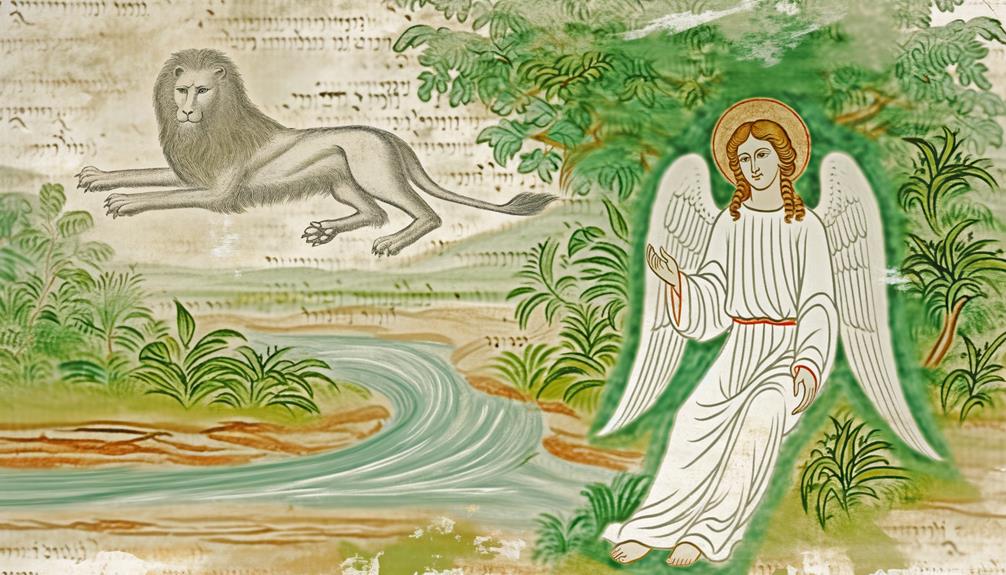Biblical Meaning of the Name Ariel
The name Ariel, of Hebrew origin, translates to 'Lion of God,' symbolizing strength and divinity. Biblically, it is used in the Book of Isaiah to represent Jerusalem, intertwining themes of judgment and redemption (Isaiah 29:1-2).
Ariel is also described metaphorically as 'altar hearth,' emphasizing Jerusalem's spiritual trials and subsequent restoration. This dual symbolism highlights both divine chastisement and the promise of hope.
Ariel's significance extends into Rabbinic literature and Christian theology, reinforcing themes of divine protection and justice. Additionally, the name's rich scriptural and historical context invites deeper exploration into its profound spiritual meanings.

Key Takeaways
- The name Ariel means 'Lion of God' in Hebrew, derived from 'Ari' (lion) and 'El' (God).
- In the Bible, Ariel is used to symbolize Jerusalem, particularly in the Book of Isaiah.
- Ariel represents both divine judgment and redemption, especially in Isaiah 29:1-2.
- The name signifies a sacrificial altar hearth, showing a connection to religious practices and divine presence.
- Ariel metaphorically embodies strength, divinity, and the transformative power of faith.
Origin of the Name Ariel
The name Ariel, derived from the Hebrew language, holds significant historical and scriptural importance, appearing in various contexts within the Bible. Originating from the Hebrew words 'Ari' (lion) and 'El' (God), Ariel translates to 'Lion of God.' This nomenclature underscores a potent symbolism, reflecting strength and divinity.
Historically, the name Ariel is not solely a personal name but also a term used in various Jewish texts. Its usage spans from ancient Hebrew literature to medieval Jewish mysticism, indicating its pervasive cultural resonance.
Scriptural references, including those found in the Tanakh, provide insight into its layered meanings and enduring legacy. This multifaceted term reflects both an individual's name and a broader metaphor for divine power and protection within biblical literature.
Ariel in the Old Testament
Ariel's presence in the Old Scripture is primarily noted in the Book of Isaiah, where it is referenced in a prophetic vision concerning the city of Jerusalem. Specifically, Isaiah 29:1-2 depicts Ariel in a context that combines both poetic and symbolic elements.
The significance of Ariel can be understood through:
- Isaiah 29:1-2: Ariel is described as the 'altar hearth,' symbolizing a place of sacrifice.
- Historical Context: The usage reflects the period's religious practices and societal norms.
- Prophetic Vision: The text conveys a dual message of judgment and hope for Jerusalem.
- Etymology: The name Ariel can be traced to its Hebrew roots, meaning 'Lion of God,' indicating strength and divine protection.
This multi-faceted role underscores Ariel's profound religious and cultural significance.
Ariel as Symbol for Jerusalem
Interpreting Ariel as a symbol for Jerusalem involves delving into the intricate layers of scriptural references and historical contexts that highlight its dual representation of judgment and redemption.
Isaiah 29:1-2 addresses Ariel as Jerusalem, foretelling both impending distress and future deliverance. Historically, Ariel, meaning 'Lion of God,' encapsulates Jerusalem's strength and divine favor. However, the prophetic warnings in Isaiah underline the city's moral decline and subsequent divine judgment.
Despite this, the name also heralds hope, as seen in the promise of renewal and restoration for Jerusalem. Thus, Ariel embodies a complex duality, symbolizing not only the city's divine connection and fortitude but also its susceptibility to divine scrutiny and eventual redemption.
Characters Named Ariel
The name Ariel appears in various contexts, from biblical texts where it symbolizes Jerusalem (Isaiah 29:1-2), to its literary usage in works such as Shakespeare's 'The Tempest,' where Ariel is a spirit serving Prospero.
Additionally, Ariel has found its place in popular culture, including its role as the titular character in Disney's 'The Little Mermaid.' Each instance of Ariel serves to underscore the name's enduring presence and evolving significance across different historical and cultural landscapes.
Ariel in the Bible
Although the name Ariel appears only a few times in the Bible, its occurrences carry significant historical and theological weight, particularly in the books of Ezra and Isaiah.
In Ezra 8:16, Ariel is mentioned as a leader summoned by Ezra to seek ministers for the house of God.
Meanwhile, in Isaiah 29:1-8, Ariel is used symbolically to refer to Jerusalem, denoting a place of divine importance and prophetic significance.
Key points of interest include:
- Ezra 8:16 – Ariel as a leader.
- Isaiah 29:1-8 – Ariel symbolizing Jerusalem.
- Historical Context – Post-exilic era in Ezra.
- Theological Implications – Prophetic visions in Isaiah.
These references underscore Ariel's multifaceted biblical role, blending leadership, symbolism, and prophetic imagery.
Ariel in Literature
Beyond its biblical roots, the name Ariel has been embraced by various literary works, where characters named Ariel often embody unique thematic elements and narrative roles.
In Shakespeare's 'The Tempest,' Ariel is a mystical spirit who serves Prospero, symbolizing freedom and the natural world. The character's ethereal nature and servitude echo the angelic connotations found in Isaiah 29:1-2.
In modern literature, Ariel appears in Sylvia Plath's posthumously published poetry collection, 'Ariel,' where the name signifies transformation and personal liberation. These literary adaptations demonstrate the versatility of Ariel as a symbol, weaving together spiritual, natural, and existential themes.
The historical context of Ariel's biblical origins enriches these narratives, offering profound layers of meaning to literary scholars and readers alike.
Ariel in Popular Culture
In popular culture, the name Ariel has gained widespread recognition, most prominently through the titular character of Disney's 1989 animated film 'The Little Mermaid,' where Ariel embodies themes of curiosity, rebellion, and transformation. Beyond Disney, characters named Ariel appear in various mediums, adding layers to its cultural resonance.
- Shakespeare's 'The Tempest': Ariel is a spirit who serves Prospero, embodying magical and ethereal qualities.
- 'Thundercats': Ariel, known as Cheetara, displays strength and agility, reinforcing dynamic female heroism.
- 'Footnotes in Gaza' by Joe Sacco: Ariel Sharon, an Israeli military leader, adds historical and political depth.
- 'Legacy of Kain' video game series: Ariel, a ghostly guardian, provides a mystical essence to the narrative.
These portrayals contribute to Ariel's rich and diverse legacy.
Ariel in Biblical Prophecies
The name Ariel, appearing in several biblical prophecies, prominently in the books of Isaiah and Ezekiel, often symbolizes Jerusalem or the people of Israel in contexts of both judgment and restoration.
In Isaiah 29:1-2, Ariel is referred to as a city besieged, “Woe to Ariel, Ariel, the city where David settled!” Here, Ariel represents Jerusalem under divine judgment.
Conversely, Ezekiel 43:15-16 mentions Ariel as part of the altar, symbolizing renewal and divine presence. Historically, these prophecies reflect periods of upheaval and hope, capturing the duality of divine discipline and redemption.
This dual symbolism underscores Ariel's complex role in biblical narratives, serving as a poignant reminder of faith's transformative power.
Theological Interpretations of Ariel
The theological interpretations of Ariel are multifaceted, encompassing its symbolism, scriptural references, and spiritual significance.
In Isaiah 29:1-2, Ariel is metaphorically used to represent Jerusalem, emphasizing themes of divine judgment and redemption.
Additionally, the name Ariel, meaning 'Lion of God,' reflects a rich tapestry of spiritual connotations, highlighting strength, protection, and divine presence throughout biblical narratives.
Symbolism of Ariel
Among the various theological interpretations of the name Ariel, one finds its symbolism deeply rooted in both the lion-like imagery and its association with the city of Jerusalem, as depicted in Isaiah 29:1-2. The name Ariel embodies rich, multifaceted meanings:
- Lion of God: Ariel translates to 'Lion of God,' symbolizing strength and divine protection.
- Jerusalem: Ariel also refers to Jerusalem, underscoring its sacred and central role in biblical history.
- Altar Hearth: The term can signify the hearth of an altar, highlighting themes of sacrifice and worship.
- Prophetic Significance: Isaiah's prophecy uses Ariel to convey messages of judgment and redemption, reflecting theological depth.
These interpretations offer a profound understanding of Ariel's symbolic significance, interweaving history, prophecy, and divine imagery.
Ariel in Scripture
Exploring the theological interpretations of Ariel in scripture, Isaiah 29:1-2 stands as a pivotal passage where Ariel is employed to denote both the city of Jerusalem and its impending trials and redemption, reflecting a profound intersection of prophecy and divine symbolism.
Historically, 'Ariel' is imbued with multifaceted meanings, including 'lion of God' and a symbol of strength. Contextually, Isaiah's prophecy foretells Jerusalem's suffering under divine judgment, yet also promises eventual deliverance. This duality underscores Ariel as both a locus of divine justice and a beacon of hope, encapsulating the city's spiritual journey.
Theologically, Ariel serves to exemplify God's sovereign plan, weaving historical events with eschatological themes, thereby enriching our understanding of Jerusalem's role in biblical prophecy.
Ariel's Spiritual Significance
Rooted deeply in scriptural exegesis, the spiritual significance of Ariel encompasses a rich tapestry of theological interpretations that highlight Jerusalem's dual identity as a vessel of divine judgment and a symbol of ultimate redemption. This duality is reflected through:
- Isaiah 29:1-4 – Ariel represents Jerusalem facing divine chastisement.
- Symbol of the Altar – Ariel, meaning 'lion of God,' signifies the sacrificial altar, suggesting divine presence and power.
- Eschatological Hope – Prophetic texts envision Ariel as a restored, redeemed Jerusalem.
- Rabbinic Literature – Ariel is seen as an emblem of both divine justice and merciful redemption.
These interpretations offer a thorough understanding of Ariel's profound spiritual dimensions within Judeo-Christian theology.
Ariel in Modern Christianity
In modern Christianity, the name Ariel is often interpreted through its scriptural references and historical context to understand its theological significance and contemporary applications. Found in Isaiah 29:1-2, Ariel is associated with Jerusalem, metaphorically representing the 'Lion of God.' This dual imagery—strength and sacrifice—resonates with Christian themes of redemption and divine power.
Historically, Ariel's usage extends into early Christian literature, emphasizing its rich symbolism. Contemporary theologians often explore Ariel's meaning to illustrate God's protective and purifying nature. Additionally, Ariel's invocation in prayers and hymns reflects its enduring spiritual resonance.
Cultural Impact of the Name Ariel
The name Ariel has permeated various cultural domains, from literature and arts to popular media, each interpreting its biblical and historical significance in unique ways.
In literature, Ariel appears as a spirit in Shakespeare's 'The Tempest,' embodying ethereal qualities.
In arts, Ariel is often depicted in religious paintings, symbolizing the 'Lion of God' (Isaiah 29:1).
Modern media has embraced Ariel in diverse forms:
- Disney's 'The Little Mermaid' (1989): A beloved animated character.
- Ariel Sharon: Former Prime Minister of Israel, whose name signifies strength.
- Operatic Works: Ariel appears in several operas, enriching the musical narrative.
- Comics and Novels: Ariel is a name used for various characters, indicating moral complexity.
Each usage reflects Ariel's rich biblical roots and evolving cultural significance.
Conclusion
The name Ariel, steeped in biblical tradition, unfurls like an ancient scroll, revealing layers of theological significance and historical context.
From its origins and appearances in the Old Covenant to its symbolic representation of Jerusalem, Ariel stands as a beacon of divine prophecy and spiritual depth.
Interwoven with scriptural references and theological interpretations, Ariel's resonance continues to echo through modern Christianity, leaving an indelible mark on cultural and religious landscapes.






